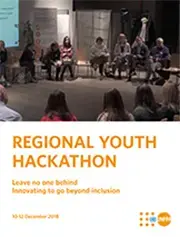Istanbul, Turkey - At the Regional Youth Hackathon that took place in ATOLYE from 10th to 12th of December 2019, participants reflected on the complexities of building an inclusive and just world, and strategies for overcoming stigma and discrimination to provide equal opportunities for all youth.
The three-day sharing and learning experience gathered activists and young people representing regional youth networks and NGO’s. The event included networks of key populations and vulnerable groups from 16 countries, as well as representatives from UNFPA Eastern Europe and Central Asia Regional Office and UNFPA Country Offices in Armenia, Moldova, Serbia, Kyrgyzstan, Turkmenistan and Ukraine.
The participants exchanged know-how across cultures and organizations during structured workshops, and provided support and feedback to their peers in more casual, intimate conversations. Participants all came together to shape a transdisciplinary innovation platform, and built a common framework for encouraging meaningful youth engagement and participation.
What were the highlights? Participants identified human connection and personal stories as a powerful tool for building empathy among diverse groups of people and overcoming discrimination. At the policy level, youth stressed the need for more resources in education and skill-building activities, and new intersectoral and political partnerships to promote employment and representation.
Youth participants emphasized the need for mobility and empowerment trainings which are created and provided by peers so that youth claims their decision making capacity from an early age. While conventional ways of engaging with fellow youth, such as international networks and UN processes were mentioned, participants also recognized the potential of the internet and new technologies to break down societal barriers and broaden the youth engagement base.





